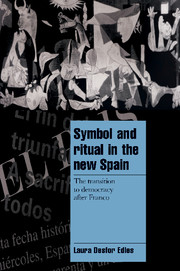Book contents
- Frontmatter
- Contents
- List of tables
- List of figures
- List of abbreviations
- Acknowledgements
- Map of Spain
- Part I Interpreting the Spanish transition to democracy
- Part II The symbolic basis of Spanish consensus
- 4 The spirit of consensus: the core representations of the Spanish transition
- 5 The curtain rises: the first democratic elections
- 6 The 1977 Moncloa Pacts and the ritualization of communality
- Part III Conflict and consensus in the institutionalization of Spanish democracy
- Notes
- References
- Index
6 - The 1977 Moncloa Pacts and the ritualization of communality
Published online by Cambridge University Press: 06 July 2010
- Frontmatter
- Contents
- List of tables
- List of figures
- List of abbreviations
- Acknowledgements
- Map of Spain
- Part I Interpreting the Spanish transition to democracy
- Part II The symbolic basis of Spanish consensus
- 4 The spirit of consensus: the core representations of the Spanish transition
- 5 The curtain rises: the first democratic elections
- 6 The 1977 Moncloa Pacts and the ritualization of communality
- Part III Conflict and consensus in the institutionalization of Spanish democracy
- Notes
- References
- Index
Summary
The Second Republic had coincided with the World Depression of 1929–1933, and following Franco's death Spain again experienced economic crisis and democracy simultaneously. This crisis was due largely to the unbalanced and dependent development from 1962 to 1975, uncontrolled inflation, the increase in the cost of raw materials, and the stabilization policies of western European countries. Moreover, between 1973 and 1977, Spain had no anti-crisis economic policy. Since the assassination of Luis Carrero Blanco in 1973, Spanish governments had focused exclusively on the political transition, treating the economy with ad hoc palliatives rather than a coherent strategy. The major problems were inflation and unemployment. While inflation never fell below 15 percent, unemployment increased by more than two and a half times between 1973 and 1977, from 3.8 percent of the active population in 1975 to 12.6 percent in 1980. Of this total number of unemployed, only 51.8 percent were entitled to unemployment benefits. The number of strikes increased tenfold between 1973 and 1978. In 1976, Spain lost 156 million working hours through strikes, compared with 14.5 million in 1975, making it the Western country with the highest strike record. And the balance of payments, which had been positive in the years up to 1974, showed a deficit of §4.3 billion in 1976.
In early October 1977, Prime Minister Suárez finally began to address these concerns. He invited nine major party leaders to join him in a two-day meeting to discuss the country's economic problem.
- Type
- Chapter
- Information
- Symbol and Ritual in the New SpainThe Transition to Democracy after Franco, pp. 81 - 98Publisher: Cambridge University PressPrint publication year: 1998

